Getting More Value From Fueling Your Fleet
If you manage a business or administer a budget for a government agency on the state or local level, how much is your fuel budget? Do you ever have...
2 min read
Erik Bjornstad : Jun 27 2016

Back in the day, the storage life of both diesel and gas was measured in years, not months. That’s not the case anymore. Once you get past 6 months for diesel fuel in storage, concerns start to grow. And you’re one of the few, if you can get 6 months out of stored gasoline if it has any ethanol content in it whatsoever.
If you’ve got stored fuel out there that’s older than six months, it’s time to check in on it.
This isn’t really a case of “they don’t make 'em like they used to”. Okay, it is on some level. Gasoline didn’t used to have widespread ethanol in it. And diesel fuel has been subject to at least two or three big changes.
Change #1 – They use a lot more “cracked” feedstocks to put together today’s diesel fuel. Cracked stocks are less stable over time and a lot more likely to turn dark and form sludge much faster than before.
Change #2 – Almost all diesel is now ultra-low sulfur diesel (ULSD). This change has made those fuels a lot less able to resist fuel microbes. So if you’ve got stored diesel that’s older than 6 months, you need to check its condition pretty soon. Chances are, you’ve already got a microbe problem. And microbe problems are probably the single biggest danger to fuel quality out there. Learn more about diesel fuel contamination.
Change #3 – Most diesel today has up to 5% biodiesel mixed into it. Please don’t bother to check the label; you’re not going to find any indication that it’s in there. If it’s less than 5% bio content, they don’t need to do any special labeling to disclose that’s what you’re getting. And this matters because biodiesel makes the fuel both more attractive to microbes and more able to attract water (which leads to microbes). Neither of these is a good thing.
The takeaway here is that if your stored fuel is more than 6 months old, you need to be extra vigilant and monitor its condition. Today’s diesel fuels don’t last anywhere near as long as they used to. And if you check your stored fuel and find problems with its condition, seek out a partner who can give you reliable recommendations on what you need to do about it.

If you manage a business or administer a budget for a government agency on the state or local level, how much is your fuel budget? Do you ever have...

The concept of preventive maintenance isn't new—we see it everywhere in our daily lives. You change your car's oil before it breaks down. You...
Maintaining today's stored backup fuels is a bigger job than it used to be. One major reason is that fuels themselves have changed. Ultra-low sulfur...